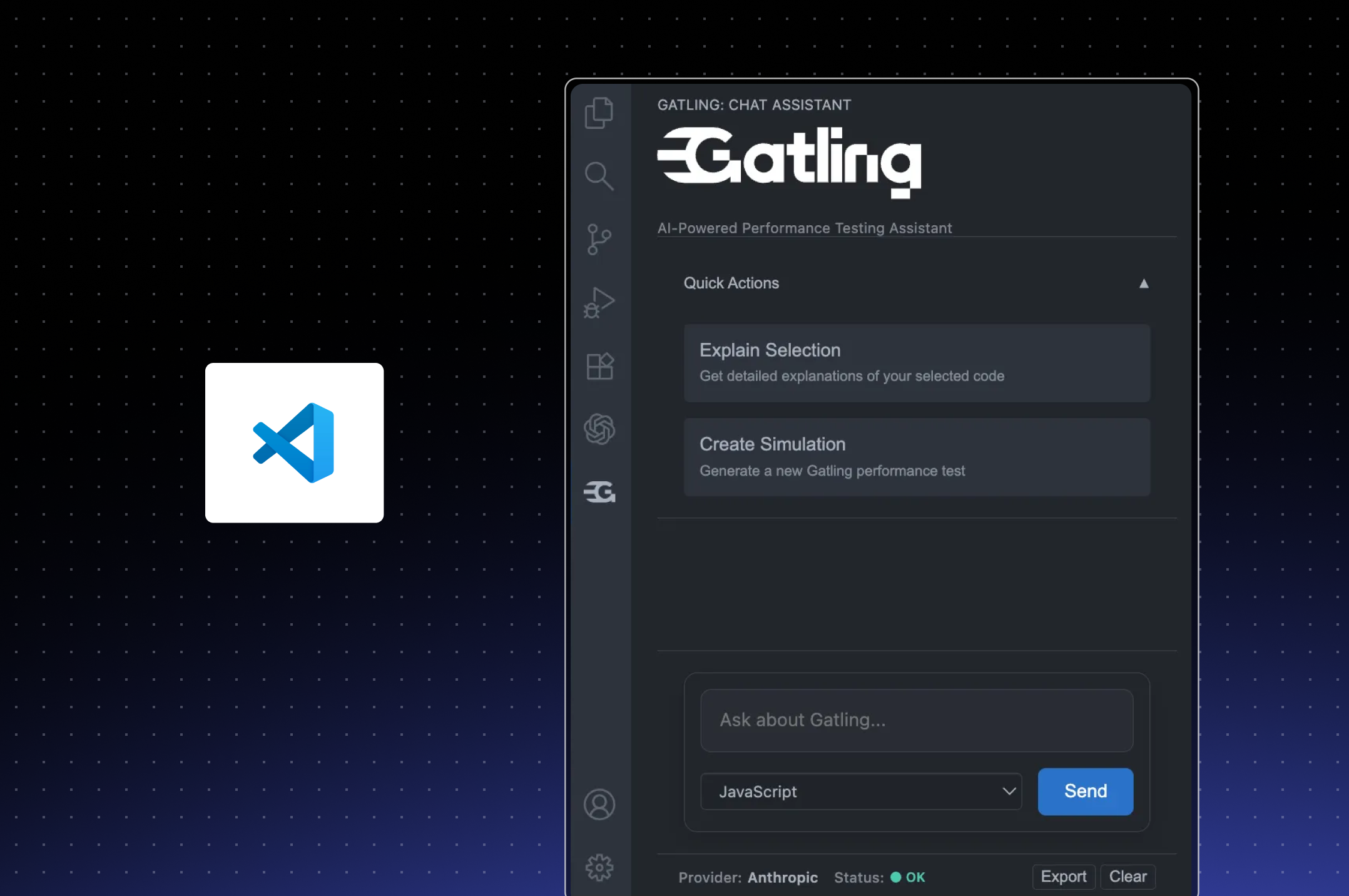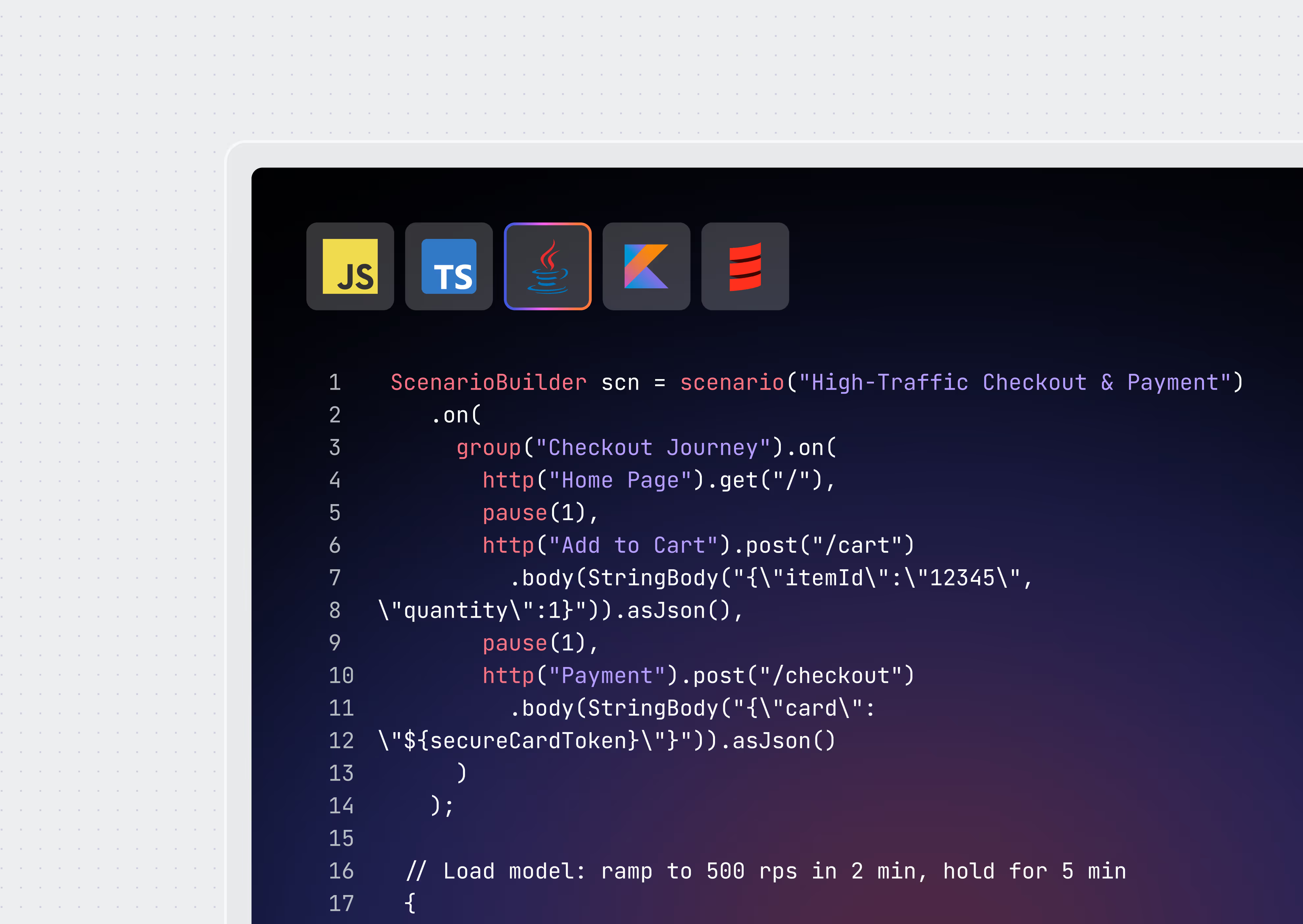Load testing for Java developers
Efficiently write load tests as code in Java. Take full advantage of one of the most powerful programming languages to script realistic user journeys with your existing libraries and development practices.
AI ASSISTANT FOR VS CODE
Accelerate test creation with AI
Our AI assistant helps you write, explain, and optimize Gatling tests directly in your IDE. Accelerate your performance testing workflow with AI-powered guidance for test-as-code. Now available on VS Code Marketplace.



Why Java for load testing?
Create realistic load tests
Test-as-code allows you to build virtual user journeys that exactly match what your users do. Use Java's object-oriented features to model complex user behaviors and business logic.
Leverage your Java expertise
Your team already knows Java—now they can apply that knowledge to performance testing. Use familiar IDEs, debugging tools, Maven/Gradle builds, and JVM ecosystem libraries without learning new tools.
Integrate with your existing stack
Use your existing Java libraries, Maven/Gradle builds, and CI/CD integrations to make load testing seamless in your development lifecycle.
INTERACTIVE DEMO
Create Java performance tests at scale
See how our Enterprise Edition makes it effortless to write, structure, and scale Gatling simulations in Java. Define complex test logic, apply strong typing, and enforce performance thresholds. All from a powerful, intuitive code-first interface.
Built for working with Java
Advanced capabilities designed for performance engineers who need deep control, scalability, and comprehensive analysis
Bottlenecks emerge under realistic load
Performance issues surface in complex user journeys with authentication, dynamic payloads, and multi-step workflows that simple GET requests can't reveal.
Complex scenarios are straightforward
Java's rich ecosystem and powerful language features make it easy to create sophisticated load tests that mirror real-world application usage patterns.
Scale testing matches production demands
Testing 10 users locally tells you nothing about what happens with 10,000 concurrent users hitting your API during peak traffic periods.
Recording captures real user behavior
Convert actual browser interactions into maintainable test scripts, preserving the timing and complexity of genuine user workflows.
Strategic performance analytics
Infrastructure that scales with you
The best experience for every team
Built for simplicity and speed
Performance testing
Cross-team collaboration
Seamless load testing that speeds your SDLC
Script complex user scenarios with ease
Java's rich ecosystem and powerful language features make it easy to create sophisticated load tests that mirror real-world application usage patterns. With Java, you can abstract common tasks like user authentication to speed up test creation and maintain consistency across scenarios.
Import your datasets and libraries from CSV, JSON, JDBC, Redis, and more to use real production data in your tests.

Record user scenarios from your web application
The Java SDK includes a built-in web recorder for capturing user scenarios and converting them into Java load test scripts.
Start from real user interactions and generate clean, maintainable Java code that preserves the timing and complexity of genuine user workflows.

FAQ
Frequently asked questions about Gatling's Java SDK
The Java SDK provides the same core Gatling functionality as other SDKs but with Java-specific advantages: strong typing, excellent IDE support, seamless integration with Maven/Gradle, and access to the vast Java ecosystem. It's ideal for teams already using Java in their stack.
Yes! You can import and use any Java library in your Gatling tests. This includes database drivers (JDBC), JSON processing libraries (Jackson, Gson), authentication libraries, custom business logic, and any other JAR dependencies your project uses.
Gatling Community Edition provides the core Java testing framework for local and single-machine testing. Gatling Enterprise adds distributed load generation, advanced reporting, team collaboration features, and enterprise integrations—all while using the same Java test code.
The Java SDK supports HTTP/HTTPS (including REST APIs), WebSockets, Server-Sent Events (SSE), JMS, gRPC, and MQTT. The community also maintains additional protocol support like Kafka. HTTP testing is the most common use case and has the richest feature set.
Work better,
release faster
Empower your teams to design, run, and analyze load tests together, without silos.
Your all-in-one load testing platform
Design complex tests, manage global infrastructure, and turn results into action on one powerful platform.
Need technical references and tutorials?
Minimal features, for local use only

